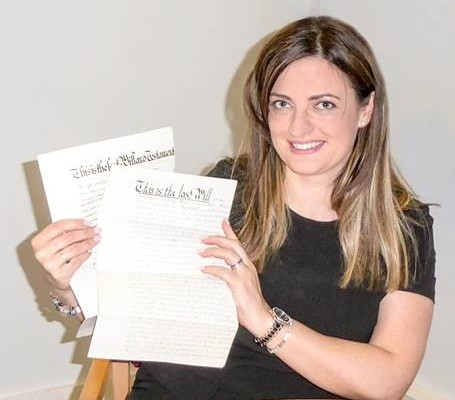- Home
- News
- What’s On
- Activities for Children
- Arts & Crafts
- Autos and Bikes
- Business events
- Car Boot & Auctions
- Charity events
- Churches & Religious
- Comedy
- Dance
- Days out & Local interest
- Education
- Exhibition
- Film
- Gardening & Horticulture
- Health
- Markets & Fairs
- Music
- Nature & Environment
- Spiritual
- Sport
- Talks and Discussions
- Theatre and Drama
- Business
- Local Information
- Jobs
- Deaths
- Charity events
- Contact Us
Local law firm home to Cheshire’s oldest unclaimed Will?

Unclaimed Wills dating back over 120 years highlights the need for people to tell their loved ones that they have one in place
Cheshire law firm SAS Daniels has uncovered almost 50 unclaimed Wills stored in its basement that date back as far as 1895.
The handwritten Wills that have never been claimed include gifts to relatives and acquaintances such as various properties including a farm and a pub, a bicycle, various items of jewellery, a sewing machine and paintings.
In addition, one of the Wills made by a gentleman, requested payment of ten shillings a week to a widower. He also planned to leave his stationery business to his assistant and all his furniture and belongings to his sons, on the condition that if there were any disputes over the sharing of any of it, that it be sold.
SAS Daniels holds paper copies of Wills for 130 years and then after this time they are digitised. If a beneficiary were to come forward to make a claim on a Will of this age, the law firm would need to try and establish what was in the estate, what has happened to it, who to make the claim against and the cost of doing it. In most cases the money will have been spent and will be difficult to trace and recover.
Justine Clowes, Partner and Head of the Private Client team at SAS Daniels said: “The age of these Wills highlights how important it is to tell your loved ones you have made a Will and where it is held.
“In spite of going to the effort of seeking professional legal advice and creating a Will, a surprising number of people don’t tell anyone that they’ve done so. This could be for a number of reasons, for example, some people prefer to keep their financial affairs private; or perhaps they intended to update it and never got round to it.
“It’s also not uncommon for someone to keep news of their Will from their family because they’ve excluded a family member, perhaps one of their children from it.
“I can’t stress how important it is to tell people you have a Will in place or if you have made changes to it. Making a Will and ensuring your loved ones know about it is the only way to ensure your wishes will be met after your death.”
If you die without a Will (intestate), or without anyone knowing about it then there are Intestacy Rules that will determine what happens to your wealth. These rules changed in October 2014 and don’t affect married people who die with less than £250,000 in assets. In those cases their spouse would inherit everything. But for those with more, the rules dictate that the surviving married partner takes all of the first £250,000 and is then entitled to half of the remainder. Any children of the deceased are then entitled to the half of what remains over £250,000. For those who are not married then the estate will pass via the bloodline. These rules are no use at all for those with more complicated family arrangements, which these days tends to be the norm.

You must be logged in to post a comment Login